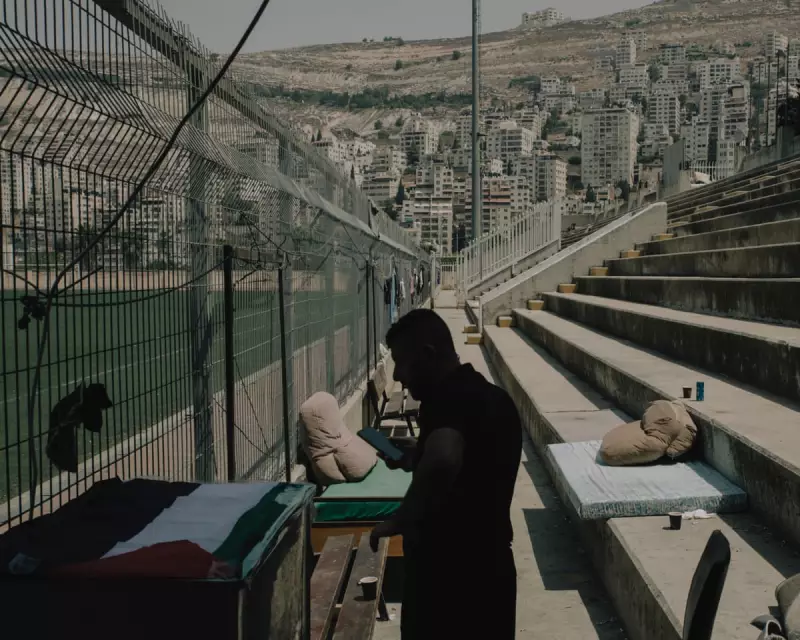
For more than two years, a group of Palestinian men from Khan Younis have been living in suspended animation inside a converted stadium in the occupied West Bank. Their lives exist in a painful limbo between exile and the war they watch unfold daily on television screens.
Life in Limbo at Nablus Stadium
Inside the dim locker rooms of Nablus municipal stadium, approximately 50 Palestinian workers from Gaza have created a makeshift home. Most sleep on mattresses or battered sofas, with laundry hanging from fences around the football pitch. The only relief from suffocating summer temperatures that can exceed 40C comes from a few electric fans.
These men are mostly construction workers who were in Israel on 7 October 2023 when Hamas launched its attack. As Israeli forces began rounding up Palestinians from Gaza, they fled to the West Bank, where they remain completely cut off from their wives and children living in makeshift tents inside the Gaza Strip.
Baker Majjar, 37, is one of the stranded workers. Before the conflict, he split his time equally between his family in Gaza and construction work in Tamra, north-eastern Israel. "They killed my nephew and his two children," Majjar reveals. "They were seeking food at an aid distribution point near Khan Younis. I've lost more than a hundred people - relatives and friends - to Israeli attacks since the war began. Then I stopped counting."
The Desperate Journey to Safety
Majjar was among the 18,500 married men in Gaza over 25 who held Israeli work permits, primarily for agriculture and construction jobs. In the immediate aftermath of the Hamas attack, Israeli forces began mass arrests of these workers. Thousands were imprisoned or deported back to Gaza with their permits cancelled.
Like hundreds of others, Majjar made his way to the West Bank seeking refuge. He crossed at Barta'a, a town straddling Israel and the West Bank that Palestinians have long used to evade official crossing checks. Eventually, he reached the Nablus stadium, which housed nearly 1,000 Palestinians from Gaza during the war's early months.
"Slowly, some moved elsewhere in the West Bank," Majjar explains. "Others were arrested by Israeli forces during a raid here at the stadium. We haven't heard from them since."
Surviving While Families Suffer
The Palestinian Authority's labour ministry provides the stranded workers with approximately 700 shekels (£162) every one to three months. They send this money to their families in Gaza, though only about half typically reaches them after various commissions are deducted. A handful have found short-term work for minimal pay.
"My wife and two sons, aged four and six, live in a tent in the al-Mawasi camp, between Khan Younis and Rafah," says Majjar. "Our house was destroyed. And I'm here, unable to help them."
The psychological toll is devastating. Maher Qudeh, 53, who worked south of Tel Aviv before the war, describes a tragic incident: "I knew a man who was here with us. He was from Gaza City. One day they told him his son had been killed. He had a heart attack from the shock and died that same day."
Wajdi Yaeesh, director of the Human Supporters Association in Nablus, recalls another heartbreaking story: "There was a man who had written the names of his eight children on the wall beside his bed. Before he left the stadium to move elsewhere, he had already crossed out four of those names - the ones who had been killed in Gaza."
Medical Patients Also Stranded
The crisis extends beyond workers. In Nablus, there are at least seven women from Gaza who either have cancer themselves or are mothers of children with cancer. They had received authorization before October 7th to leave Gaza for medical treatment, but became stranded after the war began.
Although an Israeli court blocked deportations of medical patients back to Gaza, many women moved to the West Bank for safety. In a tragic development, when The Guardian visited a Jerusalem hospital in March 2024 where at least five children from Gaza were being treated for cancer, all those children have since died. Their mothers, separated from families still in Gaza, have relocated to West Bank towns.
According to figures from the Qatar Red Crescent and UNRWA, more than 4,400 stranded Palestinian workers and patients from Gaza are currently in the West Bank.
Divided Hopes for the Future
Khaled, 51, from Tuffah in Gaza's Old City, carries the pain of not being with two of his five children when they were killed in an Israeli airstrike last year. "Now, with the truce, I only hope to hold my three surviving children and my wife again," says Khaled, who has become the cook for displaced Palestinians at the stadium. "I just want to go back to Gaza as soon as possible."
Others have lost faith in returning home. Samir Hajjaj Abu Salah, 55, from Khan Younis, is convinced there's no future among Gaza's ruins. "I never want to set foot in my home again," he states firmly. "Once my family is evacuated, we'll settle somewhere far from the Strip."
As the conflict continues with no clear resolution, these stranded Palestinians remain suspended between their past lives and an uncertain future, watching their homeland's destruction from a stadium refugee camp hundreds of miles away.





